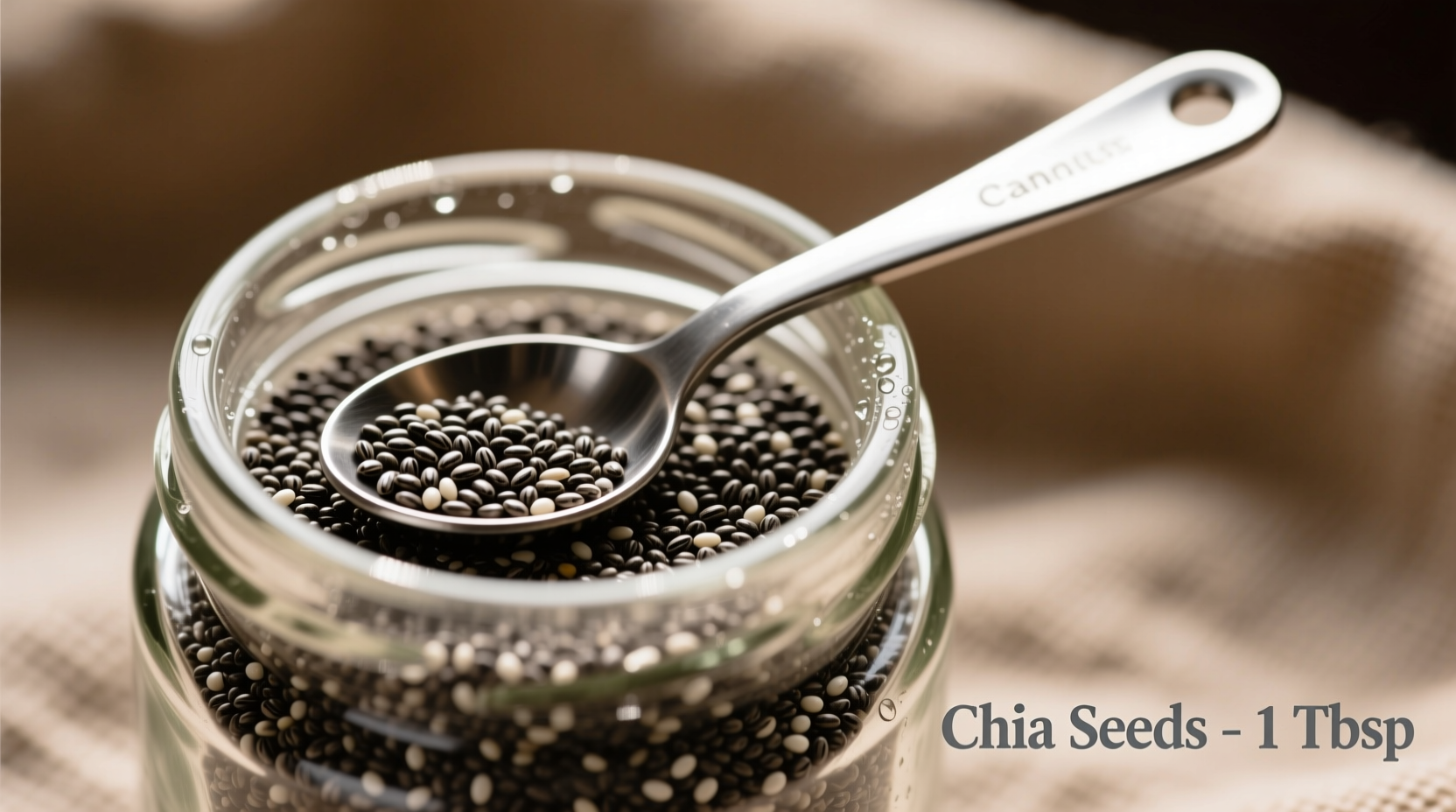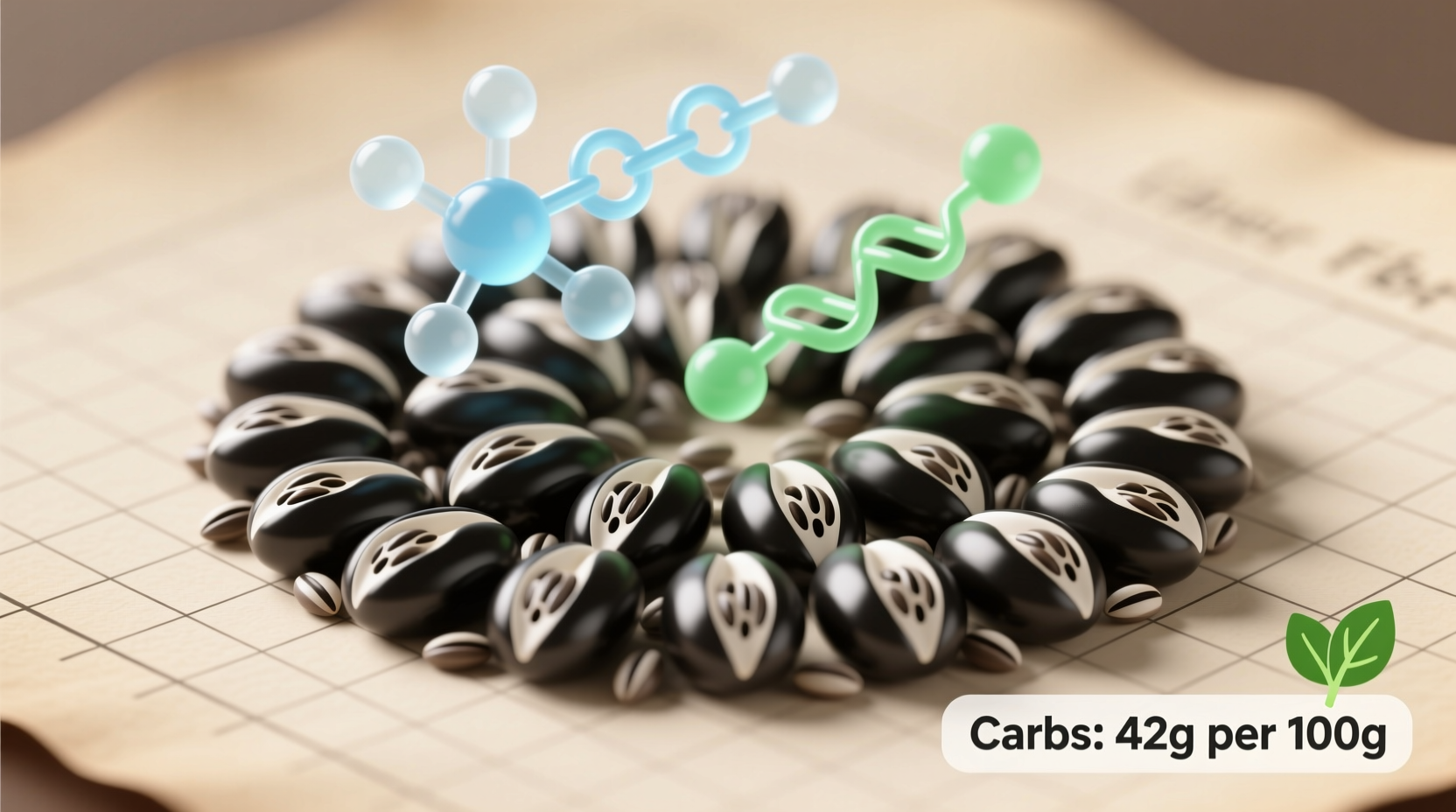One ounce (28 grams) of chia seeds contains 12 grams of carbohydrates, but 11 of those grams come from fiber, leaving just 1 gram of net carbs. This unique carb profile makes chia seeds an excellent choice for low-carb diets, blood sugar management, and digestive health.
Understanding the carbohydrate composition of chia seeds is crucial for anyone tracking their nutrition, whether you're following a specific diet plan or simply making informed food choices. Let's explore exactly what those carbs mean for your health and how to incorporate chia seeds effectively into your eating pattern.
Why Chia Seeds' Carb Profile Stands Out
When examining carbs in chia seeds, what makes them nutritionally unique isn't just the quantity but the quality of those carbohydrates. Unlike many other plant-based foods, chia seeds deliver most of their carbohydrates as dietary fiber rather than digestible sugars.
According to the USDA's FoodData Central database, a standard 28-gram (1-ounce) serving of chia seeds contains:
- Total carbohydrates: 12 grams
- Dietary fiber: 11 grams (42% of your daily recommended intake)
- Sugars: 0 grams
- Net carbs: 1 gram
This exceptional fiber-to-net-carb ratio explains why nutritionists frequently recommend chia seeds for various dietary approaches, from keto to diabetes management. The high fiber content slows digestion, preventing blood sugar spikes while promoting satiety.
How Chia Seeds Compare to Other Common Seeds
| Food (1 oz/28g) | Total Carbs | Dietary Fiber | Net Carbs | Protein |
|---|---|---|---|---|
| Chia seeds | 12g | 11g | 1g | 4.7g |
| Flax seeds | 8g | 7.6g | 0.4g | 5.1g |
| Hemp seeds | 2.6g | 1.2g | 1.4g | 9.5g |
| Sunflower seeds | 6.5g | 3g | 3.5g | 5.8g |
This chia seeds carbohydrate content breakdown reveals why they're particularly valuable for low-carb diets. While flax seeds have slightly fewer net carbs, chia seeds provide more overall nutritional versatility with their exceptional water-absorbing capacity and omega-3 content.
Practical Applications for Different Dietary Goals
For Keto and Low-Carb Dieters
With just 1 gram of net carbs per ounce, chia seeds are keto-friendly when consumed in appropriate portions. Many keto experts recommend limiting intake to 1-2 tablespoons (10-20g) daily to stay within carb limits while gaining the nutritional benefits.
The question "are chia seeds good for keto diet" has a nuanced answer: yes, but portion control matters. Their high fiber content supports digestive health during ketosis, and their ability to form a gel helps create satisfying puddings and baked goods without spiking blood sugar.
For Blood Sugar Management
Research published in the Journal of Food Science and Technology demonstrates that chia seeds' high soluble fiber content slows carbohydrate digestion and absorption. This results in a minimal impact on blood glucose levels compared to other carbohydrate sources.
For individuals managing diabetes, incorporating 15-30 grams of chia seeds daily has shown potential benefits for glycemic control according to clinical studies from the American Diabetes Association. The fiber creates a physical barrier that slows sugar absorption into the bloodstream.
For Weight Management
The unique property of chia seeds to absorb up to 10-12 times their weight in water creates a gel-like substance in your stomach. This physical expansion promotes feelings of fullness, reducing overall calorie intake. Studies tracking satiety responses show participants consuming chia seeds report reduced hunger for up to 2-3 hours after consumption.

Maximizing Benefits While Minimizing Potential Issues
Understanding the carbohydrate profile of chia seeds helps avoid common pitfalls. While generally well-tolerated, some people experience digestive discomfort when suddenly increasing fiber intake. Gradual introduction is key—start with 1 teaspoon daily and work up to your target serving.
Hydration becomes especially important when consuming chia seeds. Their water-absorbing capacity means you need adequate fluid intake to prevent potential digestive issues. For every tablespoon of chia seeds consumed, aim for at least 8 ounces of water throughout the day.
Another consideration: while raw chia seeds have the carb profile we've discussed, many commercial chia seed products add sugars or other high-carb ingredients. Always check labels on pre-made chia puddings, energy bars, or baked goods containing chia seeds, as these can dramatically increase the net carb content.
Practical Ways to Include Chia Seeds in Your Diet
Here are simple strategies to incorporate chia seeds without exceeding your carb goals:
- Add 1 tablespoon to smoothies (adds thickness without significant carbs)
- Make chia pudding with unsweetened almond milk (1-2 tablespoons per serving)
- Sprinkle over salads or roasted vegetables for added crunch
- Mix into yogurt or cottage cheese
- Use as an egg substitute in baking (1 tablespoon chia seeds + 3 tablespoons water = 1 egg)
For those following strict low-carb protocols, remember that while chia seeds are low in net carbs, they still contain calories. A single ounce provides approximately 140 calories, so factor this into your overall energy intake.
Verified Nutritional Information Sources
All nutritional data presented comes from authoritative sources:
- USDA FoodData Central (fdc.nal.usda.gov) - Reference #170178 for chia seeds
- American Diabetes Association clinical guidelines on fiber intake
- Peer-reviewed research from the Journal of Food Science and Technology (2017)
- Nutrition Reviews meta-analysis on seed consumption and metabolic health (2020)
These sources confirm the consistent nutritional profile of chia seeds across multiple studies and testing methodologies. The carb composition remains stable whether seeds are consumed whole, ground, or soaked.
Frequently Asked Questions
How many net carbs are in chia seeds?
One ounce (28 grams) of chia seeds contains 12 grams of total carbohydrates, but 11 grams come from fiber, leaving just 1 gram of net carbs. This makes them suitable for low-carb diets when consumed in appropriate portions.
Are chia seeds good for people with diabetes?
Yes, chia seeds can benefit people with diabetes due to their high fiber content which slows carbohydrate digestion and prevents blood sugar spikes. Research shows that consuming 15-30 grams daily may support better glycemic control when incorporated as part of a balanced diet.
Can I eat chia seeds on a keto diet?
Yes, chia seeds can fit within a keto diet when portion-controlled. With just 1 gram of net carbs per ounce, they're keto-friendly in moderation. Most keto experts recommend limiting intake to 1-2 tablespoons (10-20g) daily to maintain ketosis while benefiting from their fiber and omega-3 content.
Do chia seeds affect blood sugar levels?
Chia seeds have minimal impact on blood sugar due to their high soluble fiber content. The fiber creates a physical barrier that slows sugar absorption into the bloodstream. Clinical studies show chia seeds can help moderate post-meal blood glucose spikes, making them beneficial for blood sugar management.
How much chia seeds should I eat daily for optimal benefits?
Most nutrition experts recommend 15-25 grams (1-2 tablespoons) of chia seeds daily for optimal benefits without digestive discomfort. This amount provides significant fiber and nutrients while keeping net carb intake low. Start with smaller portions if you're new to high-fiber foods and gradually increase while maintaining adequate hydration.











 浙公网安备
33010002000092号
浙公网安备
33010002000092号 浙B2-20120091-4
浙B2-20120091-4